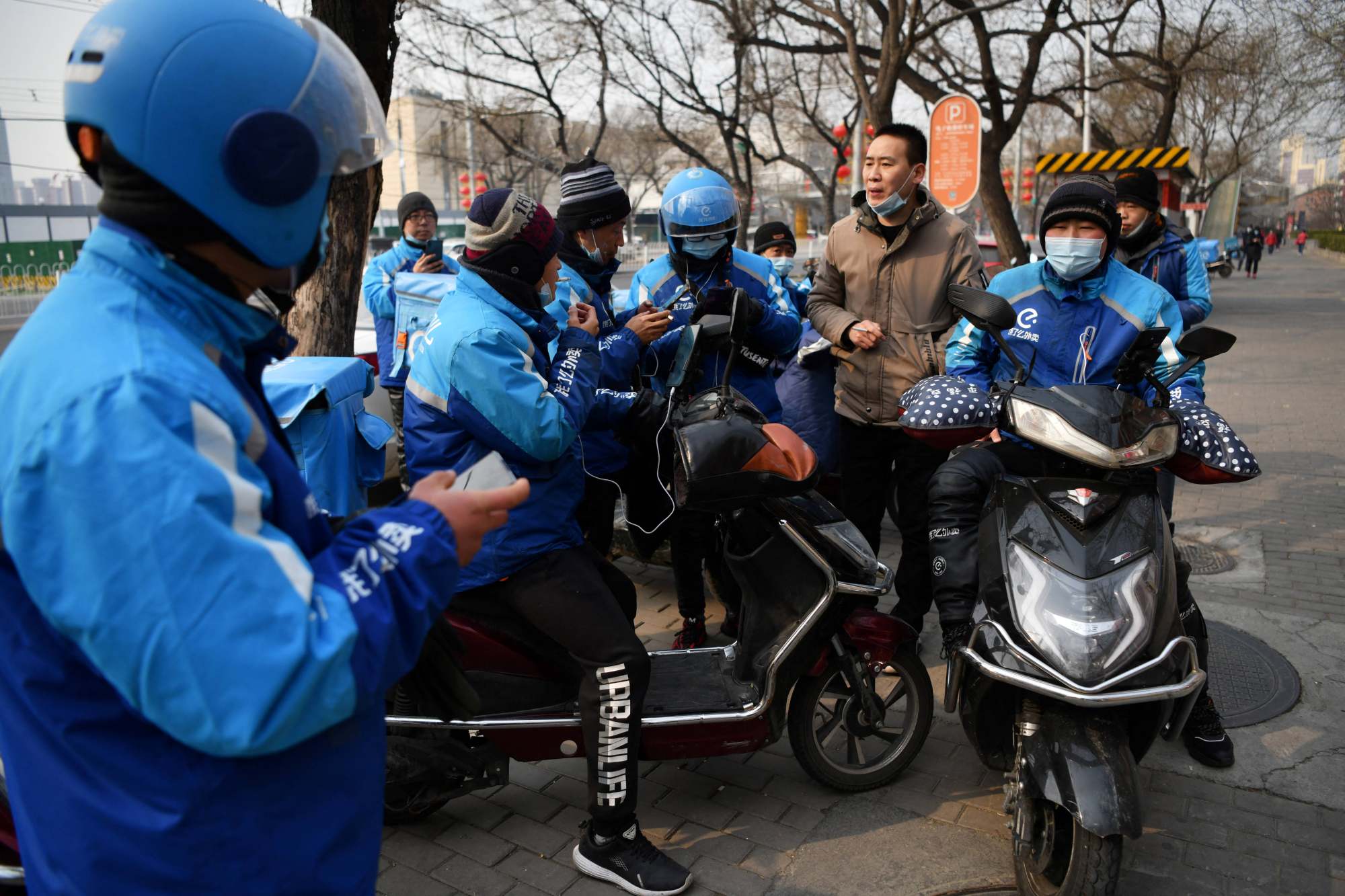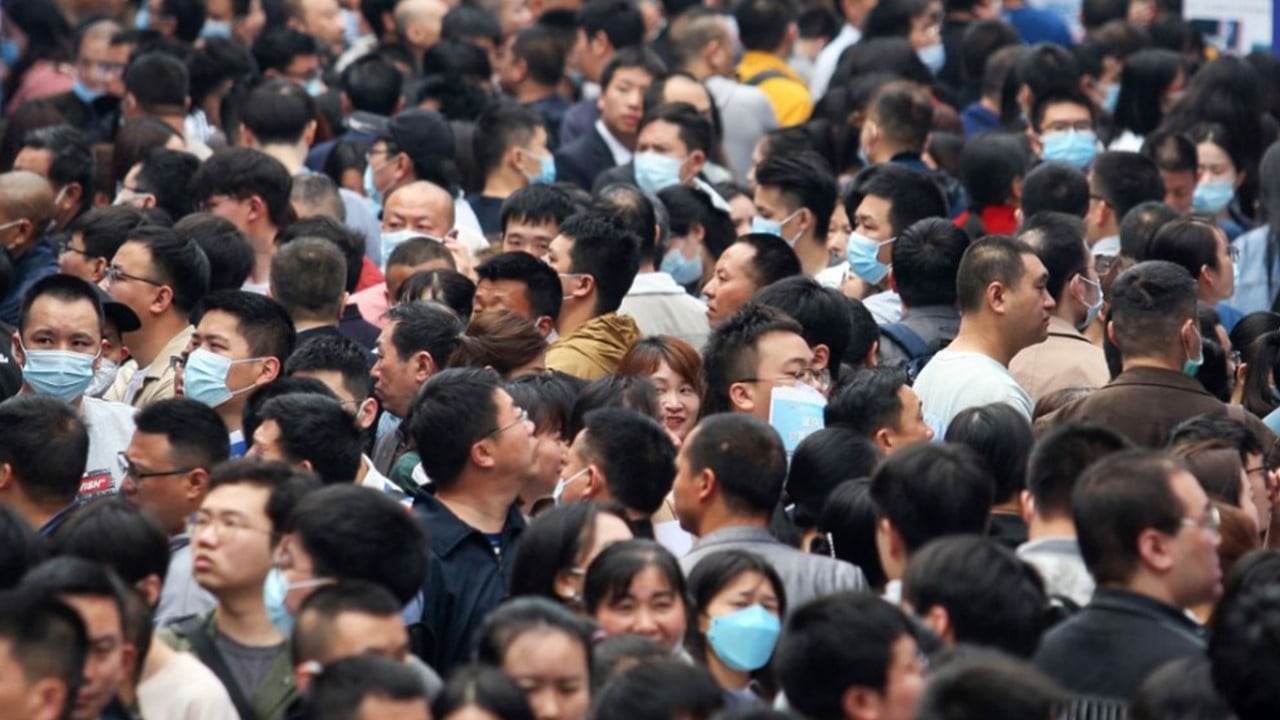
China’s vulnerable gig workers grapple with lower pay and longer hours as Beijing touts benefits of platform economy
- The slowing economy has resulted in a flood of new gig workers who have been reduced to working longer to get fewer orders than they saw during the pandemic
- In the aftermath of a bruising industry crackdown, Beijing has turned to internet platforms to boost growth, further burdening workers with little job security
The burden of buoying China’s flagging economy is increasingly falling to the country’s 200 million gig workers, who already have little job security in an increasingly saturated market, with sweltering summer temperatures only worsening searing conditions.
Food delivery riders and ride-share drivers are among the many people working under what Beijing refers to as “flexible employment”. These workers, who are effectively freelancers not protected by traditional employment contracts, are facing declining pay and longer hours this summer even as they are held up by Beijing as a model for future economic growth.
In the first summer since China’s central government lifted Covid-19 restrictions and reopened its borders, the lethargic economic recovery has not been what many had hoped. With fewer employment opportunities to go around, more workers have been pushed into the gig economy and watched their earnings shrivel ever since.
“Now I get 30 to 40 orders a day, running 15 hours a day,” the driver told the South China Morning Post in June while awaiting new orders in Beijing’s Sanlitun area. “It took fewer hours to get up to 70 orders per day previously.”
Making matters worse for those zipping around the city streets on motorbikes is the global heatwave this year that saw temperatures for half the days in June in the Chinese capital surpass 35 degrees Celsius (95 degrees Fahrenheit), while the last day of the month reached 39 degrees. That was nearly the 41-degree average high that month in Dubai, the Middle Eastern city with a reputation for brutal summers.
One Ele.me delivery rider, who joined the platform in May after losing a factory job in Shanxi province, said that he was getting 60 orders on days he worked from 9am to 10pm when he started. By June, he was getting 40 orders per day “at most”, he said.
Lunchtime, the biggest food rush of the day, coincides with the hottest time of day. Food delivery platforms have relief policies in place to compensate for extreme weather, including extra compensation.
In June, Meituan pledged to hand out 700 million yuan (US$97.4 million) as a high-temperature allowance and promised other measures including algorithmically optimising delivery routes sun exposure.
Ele.me followed with its own announcement last month saying it would also offer extreme weather subsidies. The company told the Post that it has been providing riders with heat relief supplies, optimising delivery routes and offering extreme weather training, as well.
Ride-share drivers have the luxury of working from an air-conditioned vehicle, but that has not helped their wallets.
“There are just lots of people like me who started driving for Didi after losing jobs in the last two years, making it hard especially for new drivers to get enough orders,” said Zhang, in his late 20s.
By June, Zhang was averaging 14 orders on days he worked for more than 10 hours, he said, adding that he was considering looking for another job after the expiration of his six-month car rental.
According to the country’s transport ministry, China had 5.1 million registered online taxi drivers at the end of last year, a 76 per cent increase from 2.9 million drivers in 2020. In contrast, the number of passengers grew just 20 per cent in the same span, to 437 million last year from 365 million in 2020, according to the China Internet Network Information Centre.
Big Tech hires tens of millions of gig workers in job-hungry China
In April, the Dongguan municipal transport authority said the increase in ride-share cars on the streets had reduced the daily average order per vehicle by nearly 20 per cent to just 9 orders compared with the end of 2022. Daily average income dropped by 3 per cent to 261 yuan (US$36) in the same period, the agency said.
Didi and Meituan did not respond to requests for comment.
The flood of new gig workers for Chinese platforms comes as the country’s Big Tech platforms try to recover from two years of a bruising crackdown from Beijing that only started to relent late last year. Beijing has also sought to restore confidence in what it terms the “platform economy”.
The crackdown hit every major tech firm to varying degrees as the government opened investigations related to antitrust and data security, and sought to curb the “disorderly expansion” of capital.

A May report by the China Information Economics Society (CIES), a think tank, said that the country’s digital platforms generated more than 240 million jobs in 2021, covering 27 per cent of the working-age population that year, playing a vital role in stabilising the Chinese job market.
While China’s economy grew 6.3 per cent year on year in the second quarter, according to the National Bureau of Statistics (NBS), that is compared to a period of bruising lockdowns in 2022. Business in Shanghai was effectively shut down for most of April and May last year during its harshest Covid lockdown.
Economic hardship has fallen disproportionately on young workers, as the jobless rate for people aged 16 to 24 climbed to 20.8 per cent in May, according to the NBS, compared with the national rate of 5.2 per cent. Meanwhile, nearly 11.6 million college graduates are set to enter the workforce later this year.
Since relenting on the Big Tech crackdown, Beijing officials have been openly praising the role of internet platforms in the economy.
In the meeting, Li told the companies that “the platform economy has great potential”. He also highlighted the areas where he would like to see more activity, including research and development, support for the development of core technologies, stimulating domestic consumption, and modernising small and medium-sized enterprises through the industrial internet.
Li pledged that the government would improve access to investment, reduce red tape, and create a transparent and predictable regulatory system.
However much praise Beijing heaps on internet firms, though, reviving growth will be difficult given falling exports, high youth unemployment and other challenges, according to Brock Silvers, chief investment officer with Kaiyuan Capital in Hong Kong.
“Platform company liberalisation should spur growth and present investors with interesting opportunities at some point, but it’s also unlikely to provide the rapid help that Beijing seeks as it struggles to restore China’s economic viability,” Silvers said.
As economic fears slam spending, China says it has plans to make goods cheaper
Boosting consumption remains another concern. While delivery riders and ride-share drivers are seeing income squeezed by new workers, people are not shopping like they did before the pandemic either.
That lack of demand has been weighing on local businesses.
A cashier at a bakery located in a residential neighbourhood in Beijing’s Sanyuanqiao area told the Post that it used to see around 100 delivery orders per day, even during the pandemic, when a lot of shopping activity shifted online.
But these days? “Half of that day would count as a good day for us,” the cashier said.


